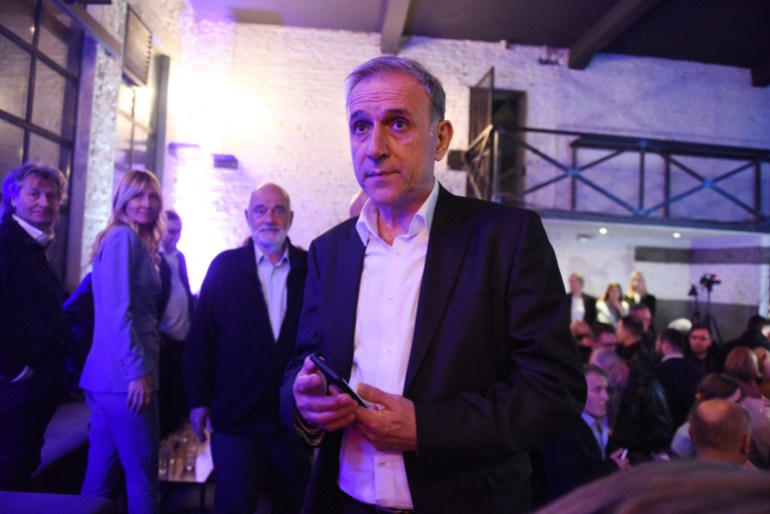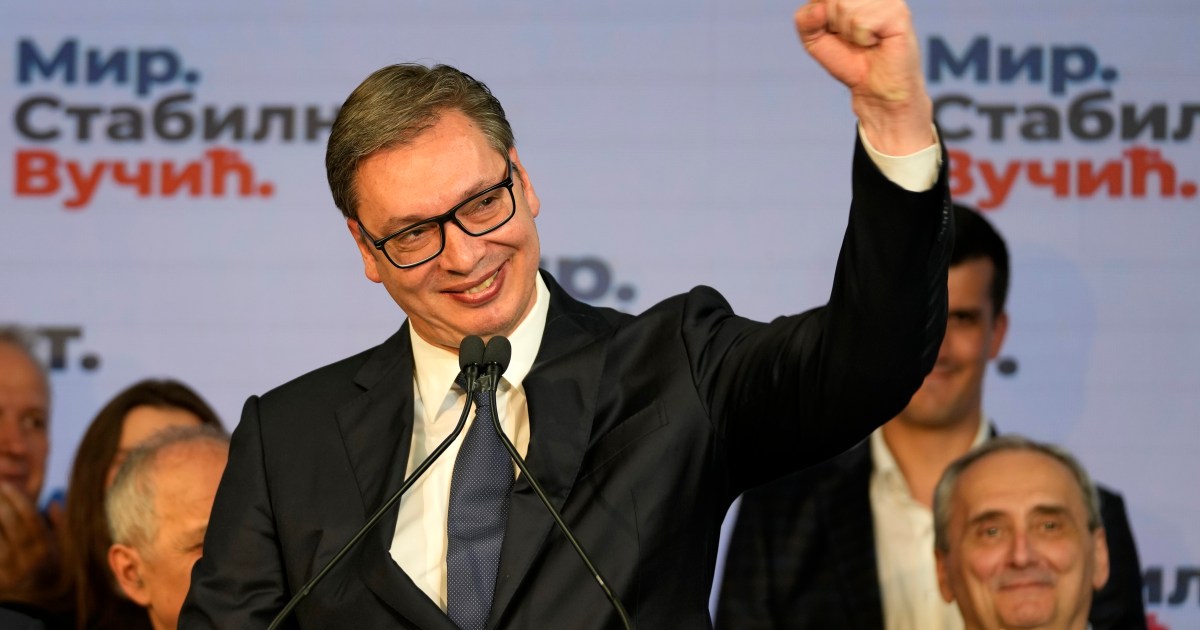‘Endlessly happy’: Serbia’s Vucic claims re-election victory
Serbia’s President Aleksandar Vucic has declared victory in Sunday’s presidential election, after pollsters Ipsos and CeSID predicted that the incumbent leader would win 59.8 percent of the votes.
Zdravko Ponos, a retired army general representing the pro-European and centrist Alliance for Victory coalition, was projected to come second with 17.1 percent of the votes.
In a victory speech, Vucic said he was proud to win a second outright mandate without going into a runoff.
“A huge thank you to the citizens of Serbia,” he said. “I am endlessly proud and endlessly happy.”
The pollsters also projected that Vucic’s Serbian Progressive Party (SNS) would win the most votes in Sunday’s parliamentary election, with about 43 percent, followed by the United for Victory of Serbia opposition group with about 13 percent.
The Socialist Party of Serbia, a longtime ally of the SNS, is seen third with 11.6 percent of the votes.
The Nada (Hope) right-wing coalition and Moramo (We Must), an alliance of green movements and parties, garnered about 5.4 percent and 4.3 percent of votes respectively.
As the SNS would likely fail to secure enough of the 250-seat parliament to rule alone, it will have to seek coalition partners.
According to the State Election Commission preliminary data, turnout stood at 58.54 percent. The commission said they would not make any official announcements on the vote count before Monday.
Ukraine crisis
Vucic ran for a second five-year term on a promise of peace and stability just as Russia invaded Ukraine on February 24, which has put Serbia under pressure from the West to choose between its traditional ties with Moscow and aspirations to join the European Union (EU).
Vucic acknowledged the conflict in Ukraine affected the campaign and said Serbia has no plans to deviate from its balancing game between the EU membership bid and close ties with Russia and China, a major investor.
“The influence of the Ukrainian crisis on the election results was huge,” the president said.
“We will maintain policy that is important for the Europeans, Russians and Americans, and that is … military neutrality,” he said, adding: “Serbia will try to preserve friendly and partnership relations in many areas with the Russian Federation.”
Serbia is almost entirely dependent on Russian gas, while its army maintains ties with Russia’s military.
The Kremlin also supports Belgrade’s opposition to the independence of Kosovo by blocking its membership to the United Nations.
Although Serbia backed two United Nations resolutions condemning Russia’s invasion of Ukraine, it refused to impose sanctions against Moscow.

Ahead of Sunday’s election, beleaguered opposition groups mostly refrained from publicly advocating a tougher line on Moscow, fearing any call for harsher measures against Russia would backfire at the ballot box.
Analysts said opposition groups still stood a chance of winning in Belgrade, which would deal a serious blow to Vucic’s rule. The governing party is less popular in the capital due partly to a number of corruption-plagued construction projects that have devastated Belgrade’s urban core.
“These elections are the beginning of the end of Aleksandar Vucic,” said Ponos, the president’s main opponent in Sunday’s vote. “These elections triggered hope and we cannot betray that hope.”
Ponos has previously accused Vucic of using the war in Ukraine in his campaign to capitalise on people’s fears.
Opposition groups said multiple irregularities were spotted during the voting. Opposition election controllers reported widespread ghost voting – voting under the names of people who are dead or do not exist – as well ruling party activists offering money in exchange for votes.
One opposition leader was attacked outside Vucic’s party offices in a Belgrade suburb, suffering facial injuries. A ruling party official was reportedly attacked in the central town of Nis.
CeSID and CRTA pollsters also reported several irregularities, including photographing of ballots.
Opposition and rights watchdogs also accuse Vucic and his allies of an autocratic style of rule, corruption, nepotism, controlling the media, attacks on political opponents and ties with organised crime.
Vucic and his allies have repeatedly denied all those allegations.




